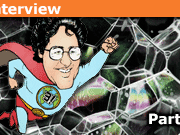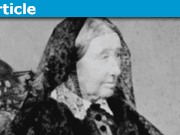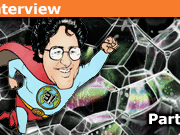Interview with Mathematician Mark44
Meet a Mentor is a series to help you get to know your wonderful Mentors better.
Constructive questions and comments are welcome!
Today we meet: Mark44
How did you become interested in mathematics?
Along about 4th grade I came across an algebra textbook that really fascinated me, with all of its x’s and y’s, and symbols like a3 that were unknown to me. I didn’t really try to learn it at the time, but when I got to Algebra in 9th grade, I really enjoyed it without having to work very hard at it. Through high school I was thinking I wanted to be an engineer, so I continued taking math through my high school years.
One time that was a turning point for me came when I was taking a college calculus class. I found myself working on a problem, wrestling with it until 3AM, even though it wasn’t assigned! At that point the die was cast.
Can you tell us about your career as a mathematics professor?
After attending a small community college in Port Angeles, WA, I thought that teaching math at that level would be an ideal job, doing something I enjoyed and was good at. From there, I transferred to a four-year school and got my bachelor’s in mathematics. I was hired as the high school math teacher in a very small school (350 students, K-12) on the Olympic Peninsula. After teaching two years, I headed off to grad school to pursue a master’s in mathematics, which was the level needed to teach in the community college system here in Washington.
After receiving my MS in mathematics, I landed a one-year contract at Shoreline Community College in the Seattle area, and was hired into a tenure-track position the next year.
During the time I was there, I taught almost every math class that was offered, ranging from low-level pre-algebra through the engineering calculus sequence and differential equations and linear algebra. After I had been there five years, I started teaching programming courses, in addition to my usual math courses, and eventually branched out to teaching courses in Basic, Pascal, Modula-2 (once), Fortran, C, and C++. In all, I taught at Shoreline for 18 years.
What topics in mathematics are you most closely watching?None, really. I keep my hand in a bit by helping out here at PF, but otherwise I don’t follow what goes on in mathematics.
Tell us about how you got started with technical writing and what is the average day like?
As I got more involved with learning C, I wanted to find out more about program optimization, and naturally drifted toward wanting to know how to write assembly code, particularly x86 assembly for the Intel processors. In pursuit of this goal I bought a number of books, one of which was a cookbook of routines for sorts and searches or that used assembly to access operating system (DOS) functionality.
I typed many of the routines into an editor and ran them, but noticed that one of the search routines (a binary search) had a bug in it and would end up next to the item being searched for without being able to find it.
I figured out what was going wrong, revised the code to fix it, and wrote a letter to the publisher of the book, together with my code on both a printout and a floppy disk.
About two months later, I received a letter from the author of the book, thanking me for my diligence. He also mentioned that he was considering writing a new edition of the book, and asked me if I wanted to go in on it with him. The code I sent him combined C and assembly, and he thought that might make the book more appealing to a wider audience.
The book was published in 1993. I didn’t make much money on the project, but it was fun, and led to a change in career later on.
In 1997, I switched careers, because a summer teaching class I was counting on for extra money didn’t get enough students. I submitted a resume to a local headhunting outfit in the Seattle area, and with my writing experience (including an article each in C/C++ Users’ Journal and PCTechnix, I got a temp programming/writer position at a large software company in the area. After 18 months as a temp, my contract expired, and I decided that I had been
teaching long enough, and wanted to continue the technical writing. At that time I resigned my teaching position, and took a permanent writing job. I’ve been here for the past 14 years.
It’s hard to describe a “typical” day, as my technical writing job has many aspects. I write documentation that is used by programmers who are creating an application. The documentation consists of reference docs (details about each class, method, etc. in a particular application programming interface, or API) and conceptual docs (higher level documentation on what you can do with the API and how to do it). The conceptual docs usually have some code samples that I write or modify. Between releases I write technical articles, that are the most fun for me. The technical articles start off with an idea for a program I write that I think people would be interested in seeing. Then I write and test the code. When I’m satisfied that my program is working the way it should, I write an article that provides a detailed explanation of what’s happening in the program.
What are some of your favorite spots or things to do in and around Washington State?
Up near the top of my most favorite activities are mountaineering and backpacking, and Washington is blessed with lots of mountains and river valleys. I have climbed all five of the Cascade volcanoes in Washington, including Mt. St. Helens before it exploded in 1980. I’ve also climed Mt. Hood in Oregon, and Mts. Shasta, Lassen, and Whitney in California.
Besides the volcanoes, I’ve climbed ~80 other peaks, mostly in the Cascades and Olympics.
My favorite backpacking area is Olympic National Park. A close friend and I have made regular trips there, ranging from two days on up to ten days, and covering anywhere from 20 to 55 miles. Our trips usually involve hikes through the backcountry, where the way involves route-finding along trails that are abandoned, very faint, or nonexistent.
A favorite place for me is Mt. Baker, the northern-most volcano in Washington. I’ve climbed to its top seven times, and have hiked on it or near it many more times. Two of the most beautiful spots in this state, IMO, are Artist Point and Skyline Divide. At Artist Point, Mt. Baker is about five miles away, and is massive at that short distance. Right behind you is Mt. Shuksan, a mountain so picturesque that it has been used as the backdrop in a number of car commercials.
If you could have lunch with living mathematician, who would it be and why?
I don’t really follow mathematics per se, other than what I do to help out at PF. I once attended a talk by Paul Erdos, but that’s about it. As mentioned earlier, a real passion for me is climbing and such – my big hero is Fred Beckey, who wrote “Climber’s Guide to the North Cascades,” a three-volume set that is the “bible” for Northwest climbers. He isn’t well known outside the Northwest, but is very well-known to anyone who climbs in this area. He has been climbing since about the late ’30s, and was still at it as recently as ten years ago or so.
What are some of your favorite movies, books and musicians?
I’m a fairly voracious reader of escapist fiction, and when I find an author I like, I stick with him. Some of the authors whose work I have devoured are Elmore Leonard, Tony Hillerman, and Vince Flynn. Regarding a particular book, Robert Pirsig’s “Zen and the Art of Motorcycle Maintenance,” which came out in 1975, struck be as so insightful that I underlined passages and made notes in the margins, something I’ve rarely done in any other book.
My two favorite musicians are Jorma Kaukonen (of Jefferson Airplane and Hot Tuna) and Mississippi John Hurt, both of whom play (or played in the case of John Hurt, who’s been gone for a long while) a kind of acoustic country blues. I’ve been playing guitar for most of my life, although I’m not that good at it for how long I’ve been at it, but I’m able to play a few of the songs by these guys in a passable fashion.
Other hobbies
I enjoy getting tinkering with my four motorcycles (all Harleys of vintages 1946, 1948, 1984, and 2000). I occasionally take long rides over to Idaho or Montana, but also take a lot of short rides on the back roads right around where I live.
Thanks for participating Mark44!
Read the next interview with MathJax dev Peter Krautzberger
I have a BS in Information Sciences from UW-Milwaukee. I’ve helped manage Physics Forums for over 22 years. I enjoy learning and discussing new scientific developments. STEM communication and policy are big interests as well. Currently a Sr. SEO Specialist at Shopify and writer at importsem.com





Cool reading about your mountaineering! I've done a little outside Seattle and would love to go back for some more!Where did you go? I'm pretty familiar with the Cascades, especially up around Snoqualmie Pass, which is near Seattle.
Ooo. Lattice C. I worked on a project at Los Alamos way back. We had installed Realia COBOL on a bunch of PC's — because someone, a priori, had decided it was the right tool for a major part of the code base. Anyway, we had to license Lattice because Realia was written on top of the Lattice library. We could have just used C and skipped the the grief and cost. I never enjoyed COBOL much, so that comment shows my bias.That's one I never learned. It looked to me like it was designed so that English majors could write code.
COBOL is the right tool when you are doing arithmetic operations on money – packed decimals do not have the issues floating point operations have. Ulp.
DOS interrupts were a big deal then, too.
I'm pretty sure our library had a copy of 'DOS Subroutines for C and Assembly' – so the book did make it to New Mexico somehow.:approve:
Wow, you know about Fred Beckey! My husband is also a big fan and is an acquaintance of his.I'm not an acquaintance, but I went to a slide show he put on in Bellevue in the late 80s or early 90s. He was already pretty old, but had been doing some recent climbs in China and many other places in the world.
I bet you and I have walked along the same paths at least once! You have far more miles on your boots than I do, though :cool:.
Are you still hiking much? Do you ever get out to Toleak Point?Well, not as much as I would like to, but I plan to do several trips this summer, including a long one in the Olympics with my buddy Steve.
I've been to Toleak Point once many years ago, and Third Beach quite a few times, plus up around Sand Point/Cape Alava down past one of those memorials (Chilean Memorial or Norwegian Memorial – I think that's the other one).
Yes, very cool profile. Its too bad your book didn't do well. It came out late after the big switch to GUI systems like Topview, Windows and OS/2 and everyone wanted to know more about them than DOS.Right. Windows was really starting to take off (Win 3.1 was out about that time), so there wasn't as much a need for command-line stuff.
Another thing that was happening was that the market for computer programming books underwent a big shift in the early 90s. Prior to that you could walk into a store like B Dalton, and see shelf after shelf with books on many programming languages, including LISP, Forth, Prolog, various assembly flavors (6502, 68000, 8086), and the more well-known ones. After that, the target audience became computer professionals rather than hobbyists, and about the only books that were offered were in Basic, C, C++, and Turbo Pascal.
I used to teach C/C++ classes to IBMers a few years in the late 80s where we used the Lattice C compiler and later Borland C on PC DOS so I remember the times well.I have a similar experience, teaching C to Boeing employees between '88 and '93, using MS QuickC.
Cool reading about your mountaineering! I've done a little outside Seattle and would love to go back for some more!The mountains are why I've stayed here so long. My rationalization for enduring the rain and gray skies is that it makes for big trees and snow and ice on the mountains. Without the rain, you don't get those. In my book, if it ain't got a big glacier on it, it ain't really a mountain.
Very impressive and inspiring, Mark. Thanks for sharing. :)
Ooo. Lattice C. I worked on a project at Los Alamos way back. We had installed Realia COBOL on a bunch of PC's — because someone, a priori, had decided it was the right tool for a major part of the code base. Anyway, we had to license Lattice because Realia was written on top of the Lattice library. We could have just used C and skipped the the grief and cost. I never enjoyed COBOL much, so that comment shows my bias. COBOL is the right tool when you are doing arithmetic operations on money – packed decimals do not have the issues floating point operations have. Ulp.
DOS interrupts were a big deal then, too.
I'm pretty sure our library had a copy of 'DOS Subroutines for C and Assembly' – so the book did make it to New Mexico somehow.
Wow, you know about Fred Beckey! My husband is also a big fan and is an acquaintance of his.
I bet you and I have walked along the same paths at least once! You have far more miles on your boots than I do, though :cool:.
Are you still hiking much? Do you ever get out to Toleak Point?
Yes, very cool profile. Its too bad your book didn't do well. It came out late after the big switch to GUI systems like Topview, Windows and OS/2 and everyone wanted to know more about them than DOS.
I used to teach C/C++ classes to IBMers a few years in the late 80s where we used the Lattice C compiler and later Borland C on PC DOS so I remember the times well.
Thanks for sharing.
I had no idea you were a mountaineer. Very interesting profile Mark!
Cool reading about your mountaineering! I've done a little outside Seattle and would love to go back for some more!